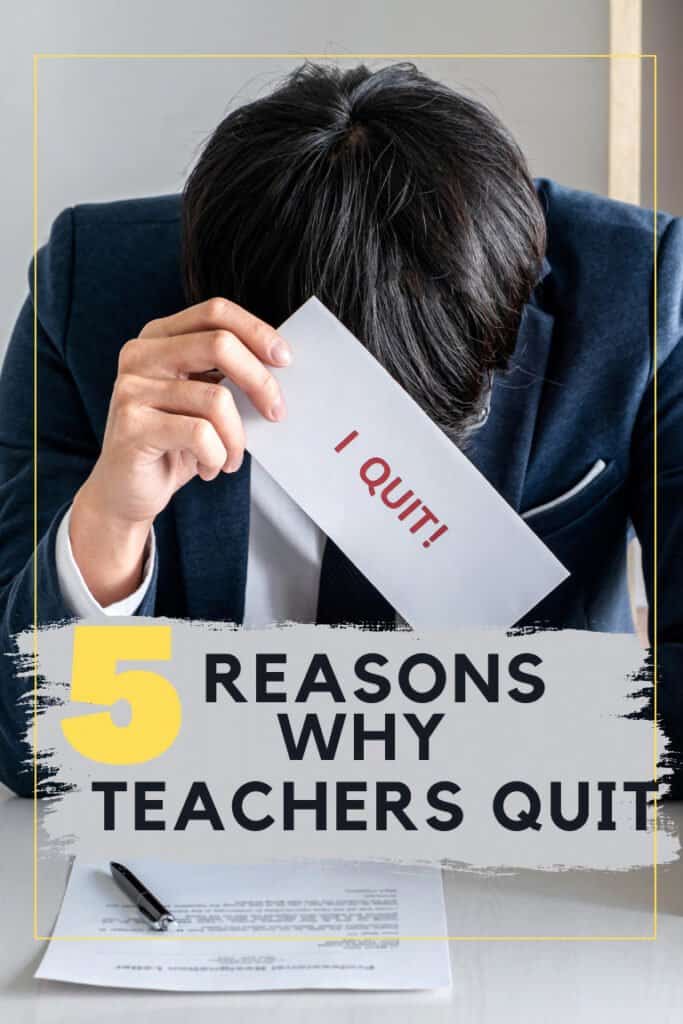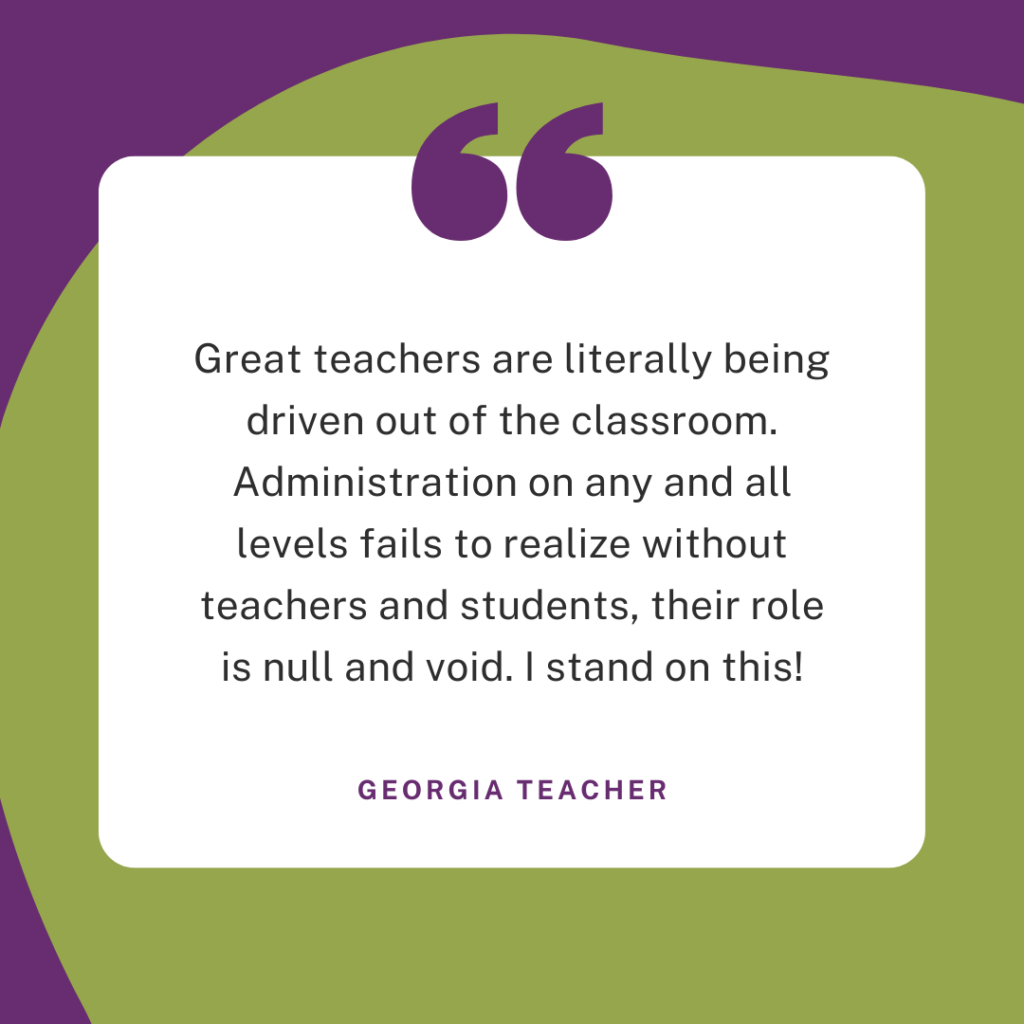Is it still worth it to be a teacher? Wow! What a loaded question and one not easily answered.
It is still worth being a teacher and it will always be. No matter what it looks like, teaching is a noble profession—one that is responsible for all other professions.
However, is it worth the mental and physical exhaustion, stress, and burnout that many American teachers experience now?
No! It isn’t worth that and not by a long shot.
Even though teaching is a noble career—the kind that molds young minds and sets the stage for the future—things have been shifting in the education field for a long time.
It has undergone many changes, raising questions about the viability and desirability of a career in teaching.
Despite all that is changing, I think a career in teaching is still worth it. However, there are caveats. You might have to create the school you want to work at or find your unicorn.
But make no mistake about it; it is still worth being a teacher. If you are called to teach, nothing will fulfill your soul’s desire other than teaching.
Changing World; Stagnant School System
Let’s face it, school hasn’t changed significantly since its inception. Schools were teacher-centered. Teachers were the authoritative figures, delivering knowledge to students in a one-size-fits-all manner.
It has largely remained that way in many public and private school systems. Students are sorted by age and, sometimes, ability. All students are taught the same material.

Don’t get me wrong. There have been attempts to address some of the issues with our traditional system. We have honor and special education classes that provide some differences.
For everyone else, teachers are encouraged to “differentiate.” However, I’ve rarely seen that implemented successfully. Often, I see grades differentiated.
Many blame COVID for our poor National School Report Card. Although COVID did have an impact, I believe it mostly revealed what hasn’t been obvious in our schools.
That is, we have been on a slow trajectory toward becoming a nation of non-readers.
Couple this with learning pods that demonstrated that parents could pool their money to hire a teacher to teach their children in a smaller, safer environment, and you have an educational revolution starting.
Since COVID, there has been an explosion of teachers quitting and starting innovative alternative school options. More on this later.
In these settings, the role of teachers has evolved. Teachers are more facilitators of learning, fostering critical thinking, creativity, and adaptability in their students.
With an increased emphasis on individualized learning and the integration of technology, teachers in these environments are accomplishing more learning and having less of a headache.

Teachers are free to create classrooms that leverage rapidly evolving technologies and adapt their teaching methods accordingly, using all kinds of resources (community, outside experts, the internet, etc.) to bring learning to life.
Challenges Facing Modern Teachers
Teaching remains a fulfilling profession for many, but it is not without its challenges for the vast majority working in failing schools and underserved communities.
Overcrowded classrooms, limited resources, and administrative pressures are contributing to teacher burnout. Sometimes, just disrespect from the admin.
A teacher on Facebook posted,
“Great teachers are literally being driven out of the classroom. Administration on any and all levels fails to realize that without teachers and students, their role is null and void. I stand on this! “
Georgia Teacher
Additionally, the increasing focus on standardized testing has led to a narrowing of the curriculum and a more rigid approach to education, leaving teachers with limited flexibility to explore innovative teaching methods.
Let’s not talk about teacher compensation. In many places, teachers are not adequately compensated for their education, expertise, and the hours they invest in lesson planning, grading, and professional development.
This financial disparity alone has led some potential educators to question whether the personal fulfillment derived from teaching is worth the financial sacrifice.
The Emotional Toll of Teaching
For most teachers, teaching is not just a profession. Teaching is an emotional and interpersonal endeavor.
We invest not only our time but also our emotions in the well-being and success of our students. We are not only teachers, but we can also be friends or parent-like.
Teachers often find themselves caught in the crossfire of societal issues.
We often address and mitigate the impact of poverty, inequality, and other external factors that affect our students’ ability to learn.
This added responsibility can be overwhelming and it often is.
Rewards of Teaching

Despite all this, teaching is still rewarding. There is nothing like the joy you get when you witness a student’s light bulb moment.
The intrinsic rewards of teaching, such as the opportunity to make a positive difference in the lives of others, cannot be measured solely in financial terms.
The impact of a teacher is priceless. I had that type of teacher, Mr. Bly. What she imparted to me helped carry me throughout my life.
I kept in touch with her until her death and my only goal as a teacher was to have the same type of impact on my students.
Thankfully, I’ve been a Mrs. Bly to many students only because she first set the example.
I personally find fulfillment in the relationships I build with my students and it does my heart good when they return and keep me posted on their wonderful lives.
Innovations in Education
So, what are teachers to do? We agree that teaching is still very much worth it; however, the abuse, stress, and burnout aren’t. And we shouldn’t normalize it.
I think teachers who are truly called to this field should consider creating their own microschools.
The rise of online learning, hybrid classrooms, modern one-room schools, and new approaches to teaching gives teachers the chance to explore alternative school options.
Embracing these innovations with parent support can reinvigorate the teaching profession and offer educators new avenues for doing what is best for themselves and their students.
Microschool is arguably the biggest innovation in education in the 21st century. In fact, according to School Choice Week’s website, more than 1 million families participate in microschooling.
Starting schools and other educational programs gives teachers the ability to have control over their lives and careers.
It’s not easy, but the journey has been so worth it. Every teacher, school founder I know pretty much says the same thing. They don’t regret the journey of starting their own school.
There is for sure, a freedom that I’ve never experienced before. In addition, I’ve had more success in remediating students because we do what the students need.
Conclusion: Is It Worth It to Be a Teacher?
The question of whether it is still worth it to be a teacher does not depend on who you ask. For me, it is definitely still worth it. I can’t see myself doing too much else.
However, it’s not worth it if I have to give up my peace of mind and live a burnt-out life.

While the challenges are undeniable, the rewards and impact on students’ lives remain powerful incentives for many educators, including myself.
The key lies in either starting your own school or finding a unicorn traditional school. I believe there are some still out there. However, I don’t think we should have to depend on the luck of the draw.
Ultimately, though, the worth of being a teacher is deeply personal and depends on one’s passion for education.
As education continues to evolve, so too must our approach to supporting and valuing those who dedicate their careers to shaping the minds of the next generation.
Thanks for sharing!
I am a teacher of foreign languages. To be honest, teaching at school is too much for me that is why I’ve been self-employed for years. Also, I decided to teach only adults. They are more responsible, and motivated and I don’t have to deal with parents.
I am happy you were able to find your niche. Working with adults who want to be there is for sure different from working with kids (some) who could care less.